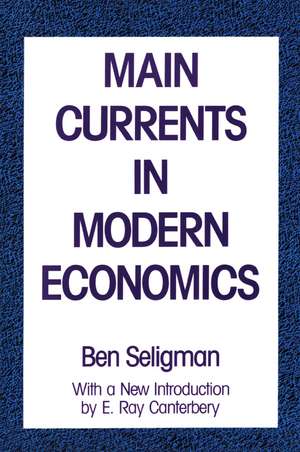Main Currents in Modern Economics
Autor Ben B. Seligmanen Limba Engleză Hardback – 18 dec 2020
Seligman also shows us how the doctrines begin to repeat themselves. Jevons, the Austrians, and J.B. Clark reaffirm tradition with the rediscovery of marginalism. A more neutral version of "equilibrium economics" is supplied by Luon Walras and Vilfredo Pareto, a main current of thought extended by John R. Hicks and Paul A. Samuelson. Seligman characterizes the principle trait of modern doctrine as the use of technique for its own sake. Dismissing G.L.S. Shackle's writing on uncertainty, he criticizes Shackle's use of continuous rather than discontinuous function.
Main Currentsmay have been published too soon to be fully appreciated. Seligman's focus on the thrust toward technique now has a ring of truth that can no longer be ignored. As Ray Canterbury notes in his introduction, in some respects only the names of the players have changed, andMain Current'spertinence to today's issues is self-evident. Economics has moved so deeply into technique that the next generation may have to rediscover the past in order to find its way out. Seligman's book is a good place to begin the journey.
| Toate formatele și edițiile | Preț | Express |
|---|---|---|
| Paperback (1) | 314.22 lei 43-57 zile | |
| Taylor & Francis – 28 feb 1990 | 314.22 lei 43-57 zile | |
| Hardback (1) | 677.81 lei 43-57 zile | |
| Taylor & Francis – 18 dec 2020 | 677.81 lei 43-57 zile |
Preț: 677.81 lei
Preț vechi: 891.32 lei
-24% Nou
Puncte Express: 1017
Preț estimativ în valută:
129.81€ • 133.74$ • 108.74£
129.81€ • 133.74$ • 108.74£
Carte tipărită la comandă
Livrare economică 24 februarie-10 martie
Preluare comenzi: 021 569.72.76
Specificații
ISBN-13: 9781138527416
ISBN-10: 1138527416
Pagini: 909
Dimensiuni: 152 x 229 mm
Greutate: 1.84 kg
Ediția:1
Editura: Taylor & Francis
Colecția Routledge
Locul publicării:Oxford, United Kingdom
ISBN-10: 1138527416
Pagini: 909
Dimensiuni: 152 x 229 mm
Greutate: 1.84 kg
Ediția:1
Editura: Taylor & Francis
Colecția Routledge
Locul publicării:Oxford, United Kingdom
Cuprins
Part One The Revolt Against Formalism, Foreword, Introduction to the Transaction Edition, 1 Protest from the Historicists, i “Geisteswissenschaft und Verstehen”: The Awareness of Man, ii Gustav von Schmoller and His “Grundriss”, iii Werner Sombart: History as Economics, iv Max Weber and the Capitalist Spirit, v Brentano, Bucher, Wagner, and Knapp, vi Arthur Spiethoff: Economics as Style, vii Simiand, Toynbee, Cunningham, and Ashley, viii R. H. Tawney: Ethics in Economics, 2 The Socialist Attack, i Marxian Economics Revisited, ii Early Critiques of Marxism: The Transformation Problem, iii The Rise of German Revisionism, iv The Fabians and Guild Socialists, v Analyses of Capitalist Maturity: Hilferding, Luxemburg, and Bauer, vi Some Russians: Tugan-Baranovsky and Investment; Lenin and Imperialism, vii Socialism without Marx, viii Contemporary Neo-Marxists, ix The Soviets Discover Calculation, 3 Institutionalism and the Dissenting Spirit, i The World of Thorstein Veblen, ii John R. Commons: Transactions and Going Concerns, iii Wesley C. Mitchell: Empiricism without Theory, iv John Maurice Clark: Social Control in Moderation, v John A. Hobson: A British Institutionalist, vi Ayres, Hoxie, Selig Perlman, and Gardiner Means, vii Countervailing Power and Affluence: J. K. Galbraith, Part Two The Reaffirmation of Tradition, 4 From Marginalism to Libertarianism, i W. S. Jevons: The Discovery of Marginalism, ii Menger, von Wieser and the Origins of Austrian Doctrine, iii Eugen von Bohm-Bawerk: The Bourgeois Marx, iv John Bates Clark: American Marginalist, v Ludwig von Mises: Libertarianism “in Extremis”, vi Friedrich von Hayek: The Austrian Tradition Refined, vii The Marginalist Debate Today, 5 Equilibrium Economics and the Unification of Theory, i Leon Walras: The Greatest Economist?, ii Vilfredo Pareto: Science as Sermon, iii John R. Hicks and the Logic of the Consumer, iv Paul A. Samuelson: Neo-Classical Synthesis, v Wassily Leontief and Input-Output Analysis, 6 Streams o
Notă biografică
Ben Seligman (1912—1970), an activist in economic affairs and a scholarly dissenter from conventional economics, wrote or edited eight books as well as numerous articles in the popular press., E. Ray Canterbery, professor of economics at Florida State University, is the author of five books or monographs and many articles in scholarly journals as well as more general media such as The New York Times Magazine. He was president of the Eastern Economics Association in 1986-87.
Descriere
Main Currents in Modem Economics deserves to be the classic it is. At the time of its original publication in 1962, Ben Seligman, a scholar’s scholar, had immersed himself in the development of economic thought since 1870. This product of his efforts is truly timeless.












